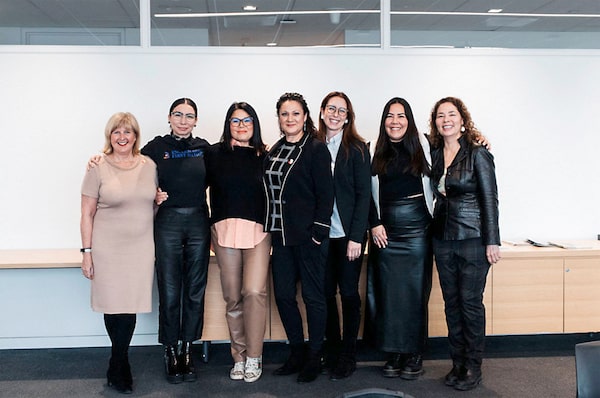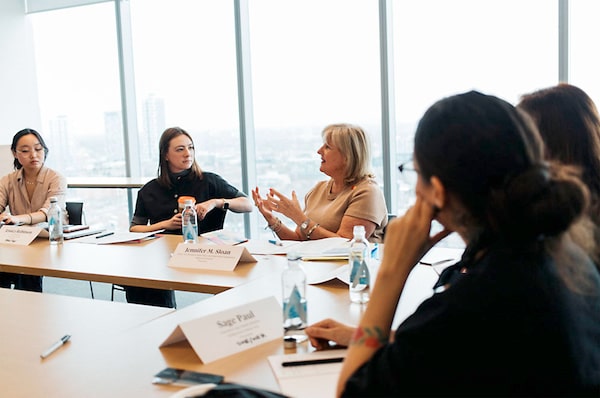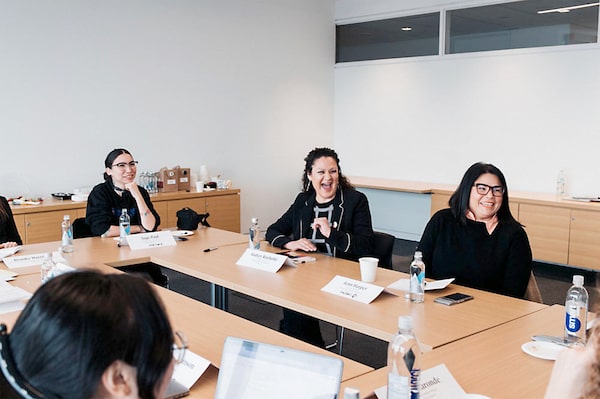You could feel the energy in the boardroom where Indigenous entrepreneurs and allies sat together to discuss how to foster the next generations of Indigenous talent.
The ‘At the Table’ roundtable, held at The Globe and Mail offices on Feb. 22, 2024, was the first in a series of four intimate discussions, presented by Mastercard, to connect Indigenous business owners and industry leaders. They discussed solutions to some of the most pressing challenges Indigenous entrepreneurs are facing.
“It’s so inspiring, as a young Indigenous woman … to see you all blaze the trail for us and the generation to come,” said Brooke Harrison, senior marketing, communications and donor relations manager at Anishnawbe Health Foundation.
The roundtable aimed to identify infrastructure needs and wants of Indigenous business owners and enterprise leaders for fostering talent and growth – the group agreed it starts with redefining entrepreneurship.

From left to right: Jennifer M. Sloan, senior vice-president of public policy and stakeholder engagement at Mastercard Canada; Sage Paul, executive and artistic director at Indigenous Fashion Arts; Jenn Harper, founder of Cheekbone Beauty; Audrey Rochette, executive director at Anishnawbe Health Foundation; Brooke Harrison, senior marketing, communications and donor relations manager at Anishnawbe Health Foundation; Sunshine Tenasco, founder and chair of Pow Wow Pitch; Sandra Laronde, executive and artistic director at Red Sky Performance.Alyson Hardwick
Perspectives and challenges in Indigenous entrepreneurship
The success of Indigenous entrepreneurship is not just about maximizing profit and cutting losses. “Social entrepreneurship is Indigenous business,” said Sunshine Tenasco, founder and chair at Pow Wow Pitch.
When Tenasco brings investors to her home community of Kitigan Zibi, they ask entrepreneurs about profit margins and annual reports, but most of them don’t have that information handy, she explained. Success is not measured by those metrics. Instead, they think about their businesses as providing access to food and homes.
“Why are we doing business? To feel safe,” she said. “There’s just a completely different way of seeing the world where the [profit] number isn’t first.”
Tenasco said she started Pow Wow Pitch to help her community view entrepreneurship as part of its culture’s present and future path to success.
Communicating that message often comes down to how it’s framed, said Audrey Rochette, executive director at Anishnawbe Health Foundation. “The language the business world speaks is not the common language to my family and community.”
Although her cousins have her entrepreneurial spirit, Rochette said they don’t necessarily frame themselves with that vocabulary. ‘Entrepreneur’ sounds like someone in a three-piece suit bustling down Toronto’s Bay Street. She said her cousins would call themselves ‘vendors.’
“I want them to understand me [as an entrepreneur] and see that they are me,” Rochette said.
Sandra Laronde, executive and artistic director at Red Sky Performance, says the traditional Euro-Canadian framing of entrepreneurship is already a barrier to access for Indigenous talent, who don’t view themselves through that lens. Another major challenge is the destabilizing effect of intergenerational trauma.
Sage Paul, executive and artistic director at Indigenous Fashion Arts, agreed that a lack of structural stability is one of the major limitations holding Indigenous entrepreneurs back, reducing their capacity to create and innovate.
“You finally feel like you get to a point [where you’re succeeding], and the tiniest thing could just completely knock you off,” she said. “There’s nothing to fall back onto.”
As an Urban Dene, Paul said she hopes Indigenous peoples, both on and off reserves, can bridge the diversity of their experiences and create welcoming spaces for each other.
“Not only is [trauma] experienced directly, but it’s also in our bones,” Paul said. “There are things we need to process and move on together.”
Fostering support networks and partnerships
Jenn Harper, founder of Cheekbone Beauty, said entrepreneurship is one way to forge ahead, adding that many Indigenous peoples have had to become adaptable and resilient to survive trauma. In her experience, those from high-stress environments thrive in entrepreneurial spaces. Still, sustainable success requires continuous care and a support network.
“When people grow up in a healthy, loving home and parents are fostering them, the leg up is just so much greater,” Harper said, describing how she’s witnessed the impacts of this care as she and her husband support their daughter through guidance and resources.
Paul affirmed that this supportive foundation is crucial. “I’m trying to figure out how to build long-term stability and longevity.”
Time and time again, Indigenous networks and communities pull through and show up for each other, but they also need the energy and capacity for self-development. This is where external and non-Indigenous support can play an important role. In addition to funding and financial investments, mentorship is a great way to empower the next generation and teach essential skills.

“We have an obligation to amplify voices,” Jennifer M. Sloan said during the discussion, emphasizing Mastercard’s commitment to creating a supportive ecosystem that empowers Indigenous entrepreneurs to start and grow their businesses.Alyson Hardwick
Tenasco said her mentorship from Jennifer M. Sloan, senior vice-president of public policy and stakeholder engagement at Mastercard, has helped her business flourish. Through a partnership with Pow Wow Pitch, Mastercard provides Indigenous-owned businesses with the support they need to help them grow, such as accessing funding and mentorship opportunities from industry experts.
Sloan’s expert guidance not only helped support Tenasco but also mended some trust gaps she had with non-Indigenous communities, a lasting legacy of Canada’s colonial history.
“There’s such a distrust,” Tenasco said. “We’re so scared of opening that door.”
Tenasco said Sloan differs from many other corporate partners because she listens first, asks the right questions and follows through on what she says with action.
Mastercard recently expanded its partnership with Pow Wow Pitch to include additional cybersecurity training, awards for budding entrepreneurs and a heightened focus on consistent growth. With a total investment of more than $800,000 and significant employee volunteerism, Mastercard is helping grow the Pow Wow Pitch program’s reach and impact in supporting Indigenous entrepreneurs.
“Yes, we give dollars, but we also provide our team members as mentors,” Sloan said about Mastercard’s partnership with Pow Wow Pitch. “We have an obligation to amplify voices.”
Sloan noted that the government also needs to have a role in these conversations. “We can’t all swim in our own lanes and think we’re going to make progress,” she said. “We need to be in situations where we hear different points of view, and we’ve got to create those situations.”
“There’s an openness to having people outside the Indigenous community who could help to elevate what’s happening within the community,” Laronde said. It boils down to the importance of attitude and reciprocity in partnerships.
The problem is when organizations treat partnering with Indigenous businesses or initiatives as a way of checking the diversity or reconciliation box. “Indigenous organizations and companies are still very much undervalued,” Laronde said.
“I have companies who treat me like they’re doing me a favour when we have an agreement in place,” Paul added.
“Is this person trying to check their reconciliation box, or has that organization actually done some work?” Rochette asked. “If the relationship is not baked in reciprocity, don’t call me.”

“Is this person trying to check their reconciliation box, or has that organization actually done some work?” Audrey Rochette asked. “If the relationship is not baked in reciprocity, don’t call me.”Alyson Hardwick
Expansion plans by Indigenous-owned businesses in Canada, including among women and younger entrepreneurs, underscores the importance of economic reconciliation for the benefit of Indigenous communities and Canada at large. Mastercard recognizes that creating opportunities for those who have historically been excluded does not take away from anyone, it lifts everyone up.
“We believe in doing well by doing good, and we see a future where people can reach their full potential with inclusive economic growth,” Sloan said, emphasizing that Mastercard prioritizes diversity, equity and inclusion, recognizing them as essential elements in fostering a more inclusive digital economy for all Canadians.
Mastercard is a founding and supporting partner of Indigenous Enterprises, a series of stories showcasing the entrepreneurs and innovators driving the new Indigenous economy.
Sloan said the next step is for other corporate partners, like Mastercard, to identify and follow through on these opportunities to support and amplify Indigenous businesses. “We are pushing for more inclusion and working on democratizing access to resources and opportunities, so they have the chance to succeed, but we need more people in this space,” she said.
Mastercard is working to create a supportive ecosystem that empowers everyone, including Indigenous entrepreneurs, so they can start and grow their businesses, access training and support, and connect with community.
Visit Mastercard to learn more.
Advertising feature produced by Globe Content Studio with Mastercard. The Globe’s editorial department was not involved.